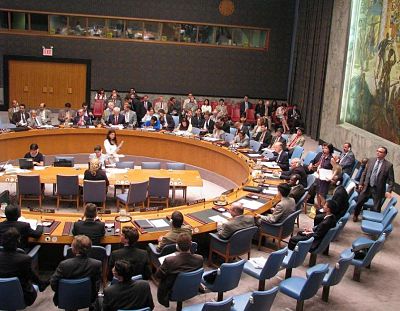UNITED NATIONS (TURKISH JOURNAL) – By Janet Ekstract – Amid the chaos in Libya, a number of parties are invested in seeing a permanent ceasefire there as well as security and stability. Toward that end, on Wednesday at the UN Security Council (UNSC) fourteen nations out of the 15-nation bloc, voted to support what has been termed as a “lasting ceasefire” and to create a monitoring system in Libya to ensure all parties abide by the ceasefire resolution put forth by the UK and Germany.
The resolution is the first definitive text adopted by the 15-nation Security Council since last April when the renewed conflict in Libya began. The only nation abstaining from the vote was Russia. Though the Russian government doesn’t publicly acknowledge the fact – it’s common knowledge that Russia’s Wagner Group has been supporting renegade warlord Khalifa Haftar, in spite of the fact that Russia initiated a ceasefire with Turkey for Libya, on January 12. .
This new resolution requires UN Secretary-General Antonio Guterres to plan for an “effective ceasefire monitoring” mechanism in what could end up being a major deployment of UN peacekeepting troops.
Belgium Foreign Minister Phillipe Goffin who spoke on behalf of EU states prior to the vote, said the document sends a “strong and clear message by the international community to the Libyan parties that the conflict in Libya must end.” Goffin added: “All member states should refrain from exacerbating the conflict and strictly comply with the UN arms embargo. The most urgent step is to reach an agreement on a lasting ceasefire.”
Meanwhile, Russia’s UN ambassador Vasily Nebenzya told council members after the vote that rival forces in Libya are not ready to end the fighting. The issue in Libya is that a multitude of militias are involved in the conflict which makes adhering to a ceasefire that much more precarious. Complicating matters further is the fact that Haftar has blocked UN humanitarian flights into Tripoli. Just last month, Haftar suddenly declared a no-fly zone over Tripoli, threatening to shoot down civilian airliners. A Haftar spokesman confirmed the blocked flights and told the press in Benghazi that the UN must use other airports like Misrata since the safety of flights into Tripoli’s Mitiga airport couldn’t be guaranteed because he said Turkey is using it as a base.
In the meantime, UN spokesman Stephane Dujarric expressed concerns from the UN mission in Libya. He explained that the mission is worried because planes transporting UN staff to and from Libya have been prevented from landing in the past several weeks. Dujarric said this “will severely hinder our humanitarian and good offices efforts,” especially in light of the fact that the UN is attempting to get the parties in conflict to negotiate a peace agreement he said and Dujarric added: “provide much needed humanitarian assistance ot the most vulnerable conflict-affected civilians.”
Moving toward the goal of seeing a permanent ceasefire began last month when German Chancellor Angela Merkel and UN Secretary-General Antonio Guterres hosted the Berlin Conference on January 19 where they both called for all countries involved to abide by the UN arms embargo and to discontinue providing warring parties in Libya with weapons.
Since then, both sides in the Libya conflict, the UN-backed Government of National Accord (GNA) led by Prime Minister Faiez al-Sarraj and the Libyan National Army (LNA) led by renegade warlord Khalifa Haftar were tasked with producing five representatives each for a Joint Military Committee (JFC) to negotiate a ceasefire. The 5+5 Libyan Joint Military Committee met in Geneva, Switzerland last Monday under the auspices of the UN according to the United Nations Support Mission in Libya (UNSMIL) to further iron out details of a more lasting ceasefire.
Currently, Tripoli’s Mitiga Airport has suspended flights with reports of renewed rocket attacks by Haftar militia groups. The Libya Observer reported that Thursday morning in Libya, there was shelling on residential areas in Tripoli that caused damage to people’s homes – with one rocket landing at Tripoli University.




